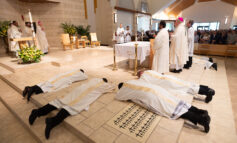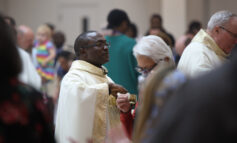Seventh in a series

Auxiliary Bishop J. Douglas Deshotel anoints with chrism a confirmation candidate during Confirmation Mass at St. Monica Catholic Church in Dallas. RON HEFLIN
By Bishop J. Douglas Deshotel
Special to The Texas Catholic
In Jesus Christ, God shared in our human life so we could share in his divine life. This new life in which we now live comes to us through the seven sacraments. In the seven sacraments, the entire saving work of Jesus Christ, accomplished by his birth, suffering, death, resurrection and ascension, is made available to us. Already, while he still walked the face of the earth two thousand years ago, our blessed lord was accomplishing His work of redemption.
Jesus introduced people to this new life. He spoke the word of God and announced the good news. He fed the hungry, cured the sick, and raised the dead back to life. Our lord showed the depth of God’s love for us as he hung upon the cross and shed the last drop of His blood giving His life that we might live forever.
The seven sacraments are the channels or vehicles which enable us to participate in this life won for us by our savior. We meet our beloved savior in the seven sacraments and he communicates to us here and now what he accomplished two thousand years ago. Each of the seven sacraments has a sensible external sign that communicate what is taking place spiritually when we receive them. We learn things through our senses of hearing, touch, taste, smell and sight.
The sacraments of baptism, confirmation, penance, Eucharist, matrimony, holy orders, and anointing of the sick all have sensible signs that communicate our lord’s presence and the saving action that is taking place when we receive those sacraments. Water in baptism reminds us of cleansing and new life. Oil in the sacrament of the sick reminds us of a healing balm that soothes open wounds. Bread and wine are food and nourishment. The words of forgiveness in penance calm our troubled consciences. The laying on of hands in holy orders signifies the bestowing of the Holy Spirit. We encounter the risen and glorified Jesus Christ in each of the seven sacraments.
As Catholics, belonging to the church means more than just enrolling in a club. Our whole faith life as a church revolves around the seven sacraments. In them we live in and with Jesus Christ as if we were on earth two thousand years ago.
Jesus Christ touches us in the most intimate way possible. In baptism we are born again as He told Nicodemus he must be in the Gospels. In the Eucharist, we are fed with the bread of life, the very body and blood of the Lord Jesus. In penance we kneel at the feet of Jesus who tells us as he did the sinful woman, “neither do I condemn you, go and sin no more.” In the anointing of the sick, we are assured as Jesus assured Martha when her brother Lazarus had died, “whoever lives and believes in me shall never die.” In confirmation, Jesus keeps his promise to send us the Holy Spirit who will strengthen and guide us to be his faithful follower.
As we prepared to celebrate the great miracle of “God with Us” at Christmas, let us remember his presence remains in our midst through the seven sacraments.
The Most Rev. J. Douglas Deshotel is an auxiliary bishop, vicar general and Moderator of the Curia for the Diocese of Dallas.



